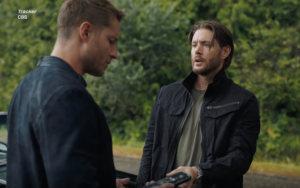
The Habit Ruining Modern TV: Tracker Season 2’s Epic Reunion Fails to Deliver
The return of Tracker for its second season brought with it high expectations, particularly for the much-anticipated reunion of Colter Shaw with key figures from his past. Promoted as an “epic” moment that would redefine the series, the reunion was supposed to deliver emotional depth and plot-altering consequences. Instead, it fell flat, leaving fans wondering if the show has fallen victim to one of modern TV’s most frustrating habits: overhyping pivotal moments without delivering meaningful payoffs.
The Build-Up: Promises of an Emotional and Groundbreaking Scene
From trailers to interviews with the cast, Tracker Season 2’s marketing leaned heavily on the reunion. The return of characters like Maggie and Detective Wyatt, both of whom played crucial roles in Shaw’s journey during Season 1, was teased as a moment that would explore unresolved tensions, strengthen character dynamics, and propel the storyline forward.
Fans speculated endlessly about how the reunion would unfold. Would Maggie confront Shaw about his secretive nature? Would Wyatt finally address the friction in their professional relationship? The promise of these emotional confrontations had viewers counting down the days to the season premiere.

The Execution: A Missed Opportunity
When the reunion finally aired, however, it felt rushed and superficial. Rather than diving into the unresolved issues between Colter and his allies, the show glossed over their history in favor of moving the plot along.
- Maggie’s Arc Felt Incomplete: Maggie, once a strong and independent character, seemed reduced to a supporting role. Her interactions with Colter were brief and lacked the emotional weight needed to address their complicated past. Instead of confronting Colter’s decisions that put her in danger in Season 1, Maggie simply offered vague platitudes about forgiveness and moving forward.
- Wyatt’s Tension with Colter Was Ignored: Detective Wyatt, known for his no-nonsense attitude and skepticism of Colter’s methods, was noticeably absent from any meaningful conflict. Their reunion lacked the tension fans expected, as Wyatt’s critical stance toward Colter seemed to evaporate without explanation.
The reunion scene came and went with little to show for it, leaving fans feeling underwhelmed and questioning why it had been hyped as such a game-changing moment.
Why This Keeps Happening
The failure of Tracker’s reunion is part of a larger trend in modern TV: prioritizing spectacle over substance. Shows often build up key moments with flashy marketing campaigns but fail to dedicate the necessary screen time and writing effort to deliver on their promises.
In Tracker’s case, the reunion could have been a chance to deepen character relationships and explore the consequences of Season 1’s events. Instead, it became a forgettable scene shoehorned between action sequences. This approach might keep the pacing fast, but it robs the series of the emotional depth that keeps viewers invested in the long run.
The Fans’ Reaction
Unsurprisingly, fans have taken to social media to express their disappointment. One Twitter user wrote:
“We waited all this time for Maggie and Wyatt’s return, and THAT’S what we got? It’s like the writers forgot what made these characters compelling in the first place.”
Another fan commented:
“Tracker used to balance action and character development so well. Now it feels like they’re rushing everything just to keep up the pace.”
What Tracker Needs to Do Next
If Tracker wants to reclaim the emotional resonance that made Season 1 such a hit, it needs to rethink its approach to character development. Future episodes should take the time to explore the fallout of the reunion, giving Maggie, Wyatt, and Colter the chance to address their lingering issues.
The show also needs to resist the urge to overhype moments that don’t deliver. Building genuine emotional stakes takes time and effort, and fans are willing to wait if the payoff is worth it.
Conclusion
While Tracker Season 2 has plenty of potential, its mishandling of the reunion serves as a cautionary tale for modern TV. Viewers want more than action and flashy twists—they crave meaningful character moments that feel earned. If Tracker can learn from this misstep, it still has a chance to solidify itself as one of television’s standout dramas.
